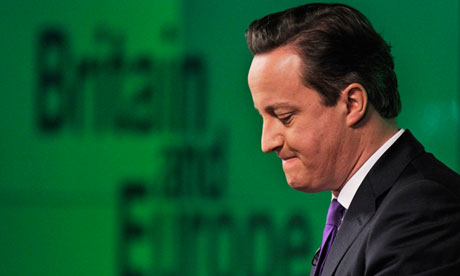David Cameron won overwhelming support on Wednesday night from the Conservative 1922 backbench committee when MPs from across the party rallied behind his pledge to hold an in-out referendum on Britain's membership of the EU by 2017.
Tory pro-Europeans, Eurosceptics and opponents of the EU praised Cameron for spelling out in clear terms the exact timing of the referendum in 2017 and the form it will take – a straightforward in-out choice.
Bernard Jenkin, the veteran Eurosceptic, told the Guardian: "This is a very significant moment. The commitment to the referendum is historic. There are unanswered questions but nothing should dwarf the significance of this. The speech sets out some very important principles about the importance of national parliaments, the importance of legitimacy and the repudiation of ever closer union is very significant."
Behind the shows of unity, however, senior Conservatives issued a series of warnings to Downing Street last night about the pitfalls for Cameron over the next five years.
Ian Birrell, his former speechwriter, described the speech in a blog on the ConservativeHome website as "padding wrapped around a stick of political dynamite". Writing of Cameron's pledge to hold an in-out referendum, Birrell said: "Mr Cameron has been forced to concede possibly the biggest gamble of his prime ministerial career. This is not throwing a slab of red meat to the right – it is giving them the keys to the abattoir."
Senior Eurosceptics illustrated Birrell's point by signalling when they made clear that the party would split, with up to 20% of its MPs campaigning for a no vote in the referendum, if the prime minister wins only "token" concessions in a renegotiation of Britain's membership terms.
One Tory said: "If the prime minister does a token renegotiation and comes back and says: 'Well I've got hospital doctors off the hook' and it is a great game set and match – a John Major situation with Maastricht – most of the Conservative party would go awol. The Conservative party is happy that we are getting a vote but it is not focusing on what the substance of the position will be."
One prominent pro-European took a different view as he hailed the speech as a sign of the prime minister's commitment to the EU. Robert Buckland tweeted: "A clear and passionate commitment to continued EU membership from @David_Cameron. Britain has a vital role to play in Europe."
Lord Ashcroft, the former Tory deputy chairman, warned that the party could actually diminish its chances of winning the 2015 general election if it allows Europe to dominate its campaign. Ashcroft wrote on the ConservativeHome website: "For most voters, including those who will need to vote Conservative for the first time if we are to have any hope of a majority, Europe barely registers on their list of concerns. The principal benefit of our referendum policy is not that it gives our campaign a headline; it is that it allows us to put the issue to rest and move the conversation on to what the voters want to discuss.
"Tories must remember that we can only get what we want once we win an election. The more we talk about changing our relationship with Europe, the less likely it is to happen."
The prime minister is aware that the path towards the referendum will not be easy. While he is an instinctive Eurosceptic he knows the dangers of allowing the party to be defined by Europe after he was first elected to parliament in the party's disastrous 2001 election which was dominated by William Hague's Keep the Pound campaign. In his first party conference speech as leader in 2006, Cameron famously said: "While parents worried about childcare, getting the kids to school, balancing work and family life – we were banging on about Europe."
But Cameron left Downing Street for the World Economic Forum in Davos with two clear thoughts after he was given a rapturous welcome by Tory MPs who waved their order papers as he arrived for prime minister's questions. First, he believes Ed Miliband walked into a trap by rejecting his in-out referendum, a position Labour compounded by suggesting that this was not definitive. Second, he believes the party will be broadly united over Europe in the run up, and through, the 2015 general election.
One senior Eurosceptic, who was consulted by Cameron as he finalised his speech, said: "The prime minister ticked a series of boxes in his speech. No to ever closer union – tick. Yes to a clear in-out referendum – tick. Yes to a return to a common market – tick. And finally – how to be on the wrong side of history by E. Miliband."
The breadth of opinion was reflected by one Tory who expects to campaign for a no vote. "When I heard that the prime minister would say he will hold an in-out referendum twice I thought fine – that's all we need."
Jenkin sounded a note of caution when he warned that Britain would face a long haul in difficult negotiations. "It is very significant that the prime minister has been explicit that [the referendum] is in on the new terms or out. But there is a long way to go before we get to that point. An awful lot of hypotheticals are being asked about what the position of the party might be at that point which the prime minister would find very difficult to answer."
"All this begs the question about what is the benchmark for a successful renegotiation. It doesn't seem likely that our European partners imagine that you can be a signatory to these treaties unless you are signed up to the principle of ever closer union. Therefore a successful renegotiation may well be on the basis of a completely new treaty between the UK and the EU."

No comments:
Post a Comment